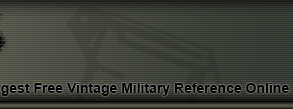|
WWII JAPANESE ARMY NCO SAMURAI SWORD - KATANA - #7 -
The NCO swords were introduced on September 16, 1935. These swords were machine made and came in six different
variations. however, two of the variations were not officially recognized by the Japanese Imperial Army.
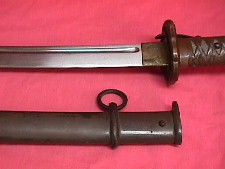
All swords were marked with a serial number on the blade and the scabbard. In addition, the arsenal markings were
stamped near the habaki in the handle. The example displayed on this page is the aluminum variation.
The sword was also issued to officer candidates on September 17, 1940.
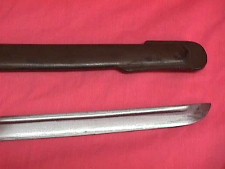
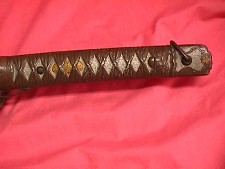
|
This page is a recognition and identification guide for Samurai swords.
Multiple detailed photos of a specific sample are provided. Descriptions point
out clearly defined points that should be noted.
One of the most commonly asked questions is "How much is my Samurai Sword worth?".
A price guide is included here to address this question. The value of the swords is
reviewed over a period of several years. A trend can be observed. The present worth
of the edge weapons in the collector's market is illustrated.
This service is provided free of charge to the visitor/enthusiast courtesy of
MilitaryItems.com,
a company dedicated to the preservation of military history and to providing quality
military antiques and collectibles to museums, institutions and the general public.
|
|
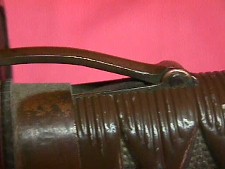
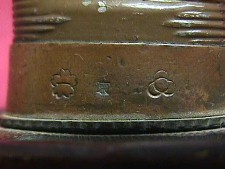
The locking mechanism was welded to the handle and it kept the blade firmly secured to the scabbard so it
would not falll off during battle. The locking mechanism is a component that breaks fairly easily if not handled
properly. The arsenal
manufacturing marking
can be seen at the base of the handle. It consists of four
balls arranged in a pyramid format and was known as the Kokura arsenal. Additional markings include a showa
stamp and a small Japanese character.
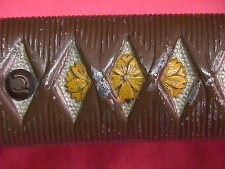 |
Just like the regular swords, the menuki and pommel portray the cherry blossoms representative of the Imperial
Army. The only difference is that in NCO swords these items are painted instead of being separate pieces.
The color most commonly applied is yellow. However, in late war examples it may be a dark brown.
|
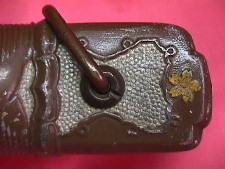 |
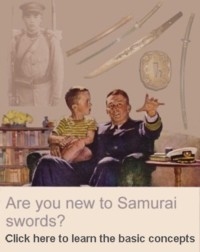
|
The Samurai sword has a very rich history. The sword has been manufactured for several centuries and continues
to be produced today. The sword represented more than just a weapon. It was the soul of the Samurai warrior.
When attempting to identify the type of sword you have It is important to keep in mind that the fittings of
a sword (scabbard, handle, crossguard. etc.) may be identical from one sword to another. The reason why is
because during WWII the same fittings were used in all Army swords, Navy swords, etc. Armed forces are all
about uniformity. They strive to make everything the same.
This is the reason why a sword cannot be identified merely by its external appearance.
Understanding the different components that make up the Samurai sword is the first step in figuring out the
type of sword you have. That is the reason why we have created the
Understanding the Samurai sword section as a means to
provide a novice with the basic knowledge to start the path of determining the questions everyone has;
who made the sword, how old it is nad how much it is worth.
|
THE BLADE
The NCO blade is easily recognized by the serial numbers engraved near the top of the blade.
Another telling fact is the blood groove which spans nearly the entire length of the blade on
both sides.
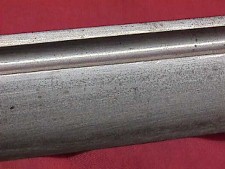
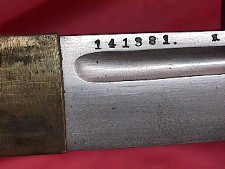
The top of the blade has some rust spots and the tip shows slight marks of sharpening
but the overall condition of the blade on this example still very good.
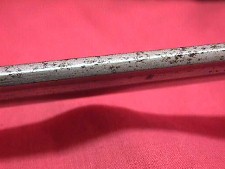
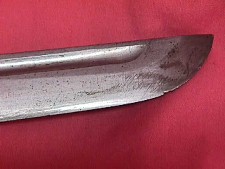
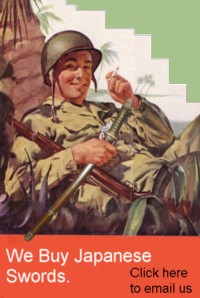
|
WE BUY JAPANESE SWORDS - All types of Japanese edge weapons. Whether it is a WWII era Samurai sword or an
older type of blade.
The process gets started by you sending us an
Email .
We will respond to your inquiry normally within 24 hours and in many cases much faster.
We can tell you what you have, what it is worth and how much we can pay you.
One sword or an entire collection -
Email Us .
|
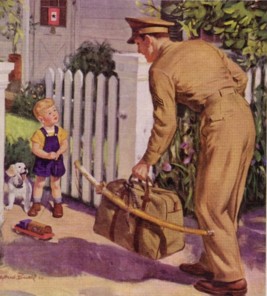 |
THE SCABBARD
The numbers on the scabbard match the numbers on the blade. The scabbard is painted with the
imperial army brown. All NCO swords were issued on this color. It was constructed of steel. Very heavy
duty. The number was stamped at the top of the throat. A single suspension ring is found just below the
top section. A drag is located at the bottom. The top section also has an opening to the side where the
locking latch engages when the sword is inserted into the scabbard.
The numbers on the blade and the scabbard match - 141381.
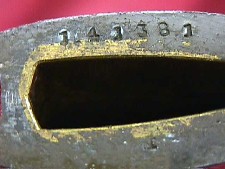
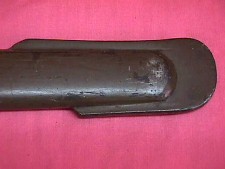
THE TSUBA
The tsuba ob the NCO swords is normally a completelly solid design. The tsuba shown here is
a much more ornate and thinner example and is constructed from brass. The design consists of large openings
on two sides and a smaller one on the direction of the cutting edge. The locking latch tip peeks through
one side ready to engage the scabbard. Both, top and bottom of the main body show heavy pebbling. This
quality of Tsuba construction is seen in early war examples.
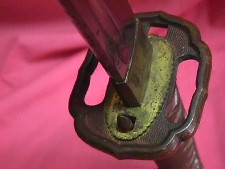
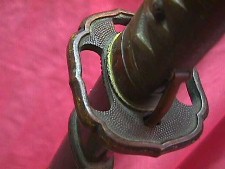
By the Numbers
It is next to impossible to determine the exact number of Samurai swords that were produced and issued to
Japanese soldiers during the war. However, thanks to the record keeping maintained by the US Armed Forces,
it is possible to estimate how many swords were actually shipped home.
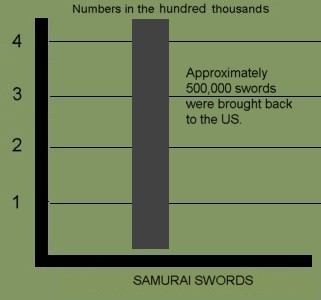 |
There were over 500,000 Samurai swords were brought back home as souvenirs from the war.
There are several caviats to this number.
|
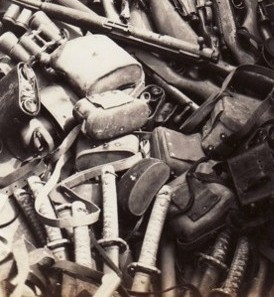 |
For example, some soldiers took souvenirs and shipped them home circumbenting the established process.
Some of the swords were brought back inside duffle bags without anyone knowing except for the soldier who
captured the sword. This fact would clearly affect the final count.
The number also does not account for swords that were taken by Allied soldiers from other countries.
Collecting Samurai swords
Collecting Samurai swords is a field that has been growing since the days the GI's rummaged around Asia
bringing back military souvenirs. Japanese soldiers carried many of these swords when they went to
battle. Once the soldier was killed or captured, the Americans would take the edge weapons as war trophies.
Eventually all these pieces came back to the United States where military history enthusiasts began to collect them.
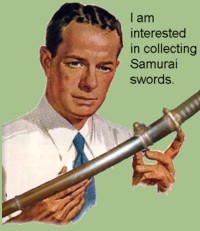 |
In trying to determine if you should collect Samurai swords there are certain factors that should be
considered.
The adjacent table outlines some of the advantages and disadvantages of collecting the Samurai swords.
|
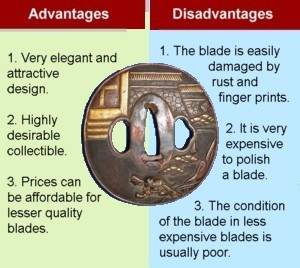 |
This Samurai Sword may be currently reproduced.
It is becoming more difficult to be able to tell the fake ones from the real ones because
the quality of the reproductions is improving. The collector must become familiarized with
the construction style and materials employed in the manufacturing of this item.
Attention to the details is critical in order to be able to determine the authenticity of
the collectible.
If you have an interest is seeing other Japanese Samurai swords, you can do so by going to our
Japanese Samurai Swords Price Guide
identification guide. Where we cover Samurai swords from all periods.
| 

